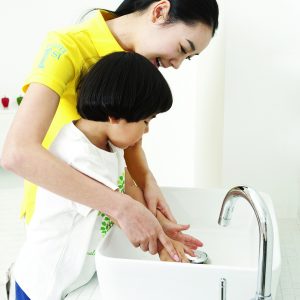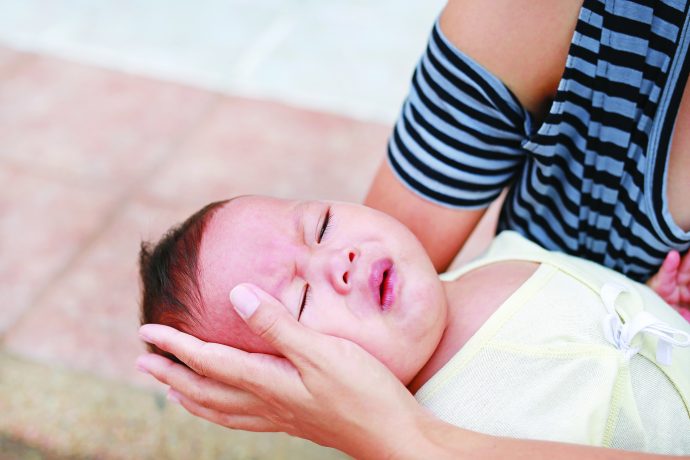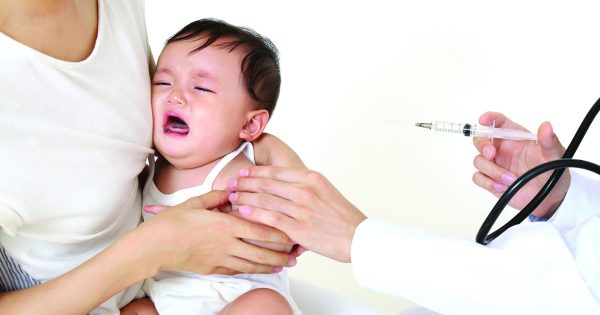Diarrhoea is a typical illness and one of the most common causes of severe diarrhoea in children is rotavirus. By the age of five, your child would have been infected at least once, and it may happen again, but you can prevent this from recurring.
In 2013, the World Health Organization (WHO) estimated about 215,000 rotavirus deaths for children under 5 years. In Malaysia, rotavirus infections cause more than 8,500 hospitalisations yearly. Adults are also affected by rotavirus, but with milder symptoms.
Symptoms and transmission
Symptoms usually start within 2 days after a child is exposed to the virus. A typical symptom of rotavirus infection is diarrhoea that lasts for 3 to 8 days. Other symptoms include vomiting, fever, abdominal pain, and tiredness/lethargy.
Being a highly contagious virus, rotavirus is shed in the stool of infected people. It can then spread easily through hand-to-mouth contact. The virus is also stable in the environment and remains infectious for a week, so any contact with contaminated surfaces or objects, and ingestion of contaminated water/food can also lead to infection.
For example, a child with rotavirus can spread the virus onto objects he touches after using the toilet. Parents may also spread the virus after helping the infected child use the toilet or after changing diapers. Another person can get infected if he touches the contaminated objects or surfaces (clothes, beddings, toys, utensils, door handles, stationery, etc.) and get the virus in his mouth.
Beware of dehydration
The biggest concern of a rotavirus infection is dehydration due to severe diarrhoea and vomiting, coupled with poor oral intake. Dehydration, or loss of body fluids, can be life-threatening, especially to infants, young children, older adults and people with other serious illnesses. Plus, children may not feel like eating or drinking due to their symptoms and babies are not able to express themselves to notify parents or caretakers about the condition of their body.
Beware of the symptoms of dehydration:
- Little urination or dry diapers
- Crying with no tears
- Dry mouth and throat
- Anxiousness
- Dizziness
- Extreme sleepiness
- Sunken eyes
Managing the disease
Take your child to see a doctor if he is showing any symptoms of diarrhoea and vomiting, and show signs of dehydration. Do not assume the symptoms are a general illness. There is no specific medicine to treat the infection, but certain medications may be prescribed to alleviate the symptoms. Antibiotics are not effective against this viral infection.
Preventing dehydration is the main focus of treatment. Give your child plenty of fluids from drinks or foods. Plain water or oral rehydration solution are the best options for older children. You can continue feeding your baby with breast-milk or formula as usual. Oral rehydration solutions may be recommended. However, avoid carbonated drinks, apple juice, dairy products (except yoghurt) and sugary foods, as these may worsen the diarrhoea.
Preventing infection

Practising good hygiene is the most basic method of prevention. Frequent and thorough hand-washing is crucial, especially after using the toilet, changing your child’s diaper or helping him use the toilet. Surfaces in your home should also be disinfected regularly.
Rotavirus lifespan…
Human hands – about 4 hours
Hard dry surfaces – about 10 days
Wet areas – for weeks!
Alcohol-based disinfectants and anti-bacterial cleaning products may not be sufficient to kill. Mix a bleach solution (1 part bleach to 9 parts water) to wipe all possible surfaces at home and vehicle.
Rotavirus vaccines are also highly recommended as a preventive measure. The first dose can be administered orally as early as 6 weeks after birth, with a total of 2-3 doses depending on the vaccine type. WHO recommends the use of rotavirus vaccines as part of a comprehensive strategy to control diarrhoeal diseases, together with other prevention and treatment efforts.
The Malaysian Paediatric Association has been pushing for the inclusion of the rotavirus vaccine in the national immunisation programme (NIP) to follow WHO’s recommendation since 2017. More than 80 countries have introduced the vaccine in their NIP and hopefully Malaysia will follow suit. Until then, parents can get the vaccine from private practitioners and paediatricians. Rotavirus infection is common, but it does not mean parents should take it lightly. Proper care and attention are still necessary to prevent further complications and transmission.
An educational contribution by Malaysian Paediatric Association.







Comments